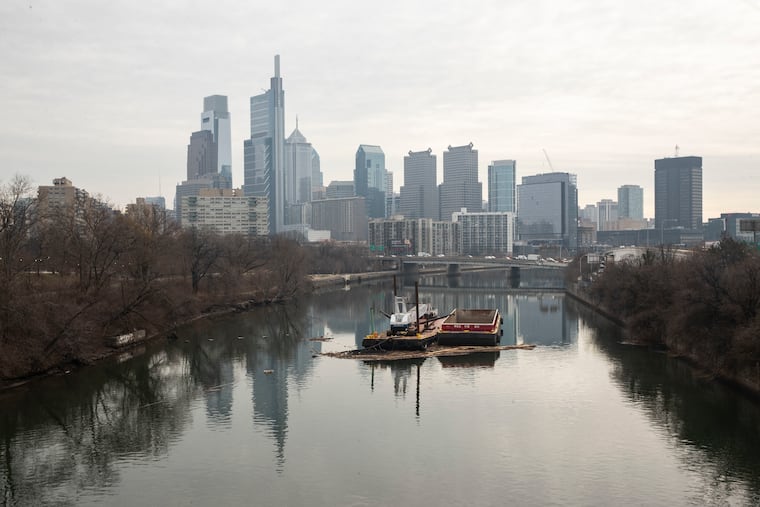Long-stalled Boathouse Row dredging will get $5 million from infrastructure bill to restart the project
The Philadelphia rowing community says racing lanes and other areas need clearing or the city could lose its famed regattas.

A halted dredging project to help rowers keep and maintain regattas on the Schuylkill will receive $5 million to restart — joyous news to those along Philadelphia’s famed Boathouse Row who have waited years for the muck to be cleared from the river.
The money will come from the bipartisan infrastructure bill signed into law in December by President Joe Biden, according to an announcement Friday from the office of Sen. Bob Casey (D., Pa.).
“This is an unbelievable development,” said Bonnie Mueller, commodore of the Schuylkill Navy, an association of amateur rowing clubs in Philadelphia. “We have been working so, so hard for this.”
The money will go toward a new contract the U.S. Army Corps of Engineers is seeking with a dredging outfit to take over a job begun in June 2020 by Atlantic Subsea of Bridgeport, N.J. The Army Corps was manager of the project.
But Atlantic Subsea ran into problems during the complicated dredge, and said it needed more money to continue working after it found too much large debris such as telephone poles at the bottom. Work stopped in November 2020, and the Army Corps officially terminated the contract in February 2021.
However, that resulted in a lawsuit and hampered further progress. The delay rankled the Schuylkill Navy and local rowing community, which say racing lanes and other areas need clearing or the city could lose its famed regattas.
» READ MORE: Schuylkill dredge project halted as contractor says there’s too much debris in river, infuriating rowers
It took years for the Schuylkill Navy to raise the initial $4.5 million for the dredge. The city of Philadelphia, the state, rowing clubs, the William Penn Foundation, the rowing and paddling communities, and the public all pitched in, as did Drexel, Thomas Jefferson, La Salle, Saint Joseph’s, Temple, and Villanova Universities, and the University of Pennsylvania.
About $1 million of that money was spent before the project ground to a halt. So the additional $5 million, plus the remaining $3.5 million, should be available for a new contract.
Mueller said she hopes dredging can begin as soon as July.
Steve Rochette, a spokesperson for the Army Corps, said he could not comment on the current litigation, and could not speculate on the cost of a new project. But he said it is “good news” that the project has the money to move forward.
He said the Army Corps is in the process of a “re-procurement” for a new contract, but did not have a firm date on when that would happen.
Mueller estimated last year that only about 5% of the dredging had been completed. The project also ran into COVID-19 restrictions while Atlantic Subsea was undertaking it.
It had been more than 20 years since the nontidal Schuylkill above the Fairmount Dam had been dredged. The project calls for dredging three miles of the river to remove 60,000 cubic yards of sediment that’s created a dangerous situation for rowers and possibly threatens future regattas.
It’s been part of a rough few years for the rowing community. In August 2020, a deluge on the river from the remnants of Tropical Storm Isaias caused a 100-ton barge being used in the project to strike the Vine Street Bridge. In addition, work had to be carried out around fish migration schedules. All the docks in front of Boathouse Row had been removed and stored upstream in anticipation of dredging.
Boathouse Row was flooded again last summer during the remnants of Hurricane Ida.
“The announcement of this allocation feels like an adrenaline shot in the middle of what continues to be a long race to restore the depth of the Schuylkill,” Mueller said. “As the Schuylkill Navy, we remain indebted to our city partners who remain relentlessly focused on completion of this mission, which now feels far more within reach.”
Mayor Jim Kenney said he welcomed the new funding.
“This is a great day for rowing in our city, and all of the local organizations and individuals who have been working so hard to help preserve the Schuylkill River,” Kenney said.
Kathryn Ott Lovell, the city’s Parks and Recreation commissioner, said, “This investment will mean regatta organizers and rowers can expect a safe, accessible course on the Schuylkill River for many years to come.”